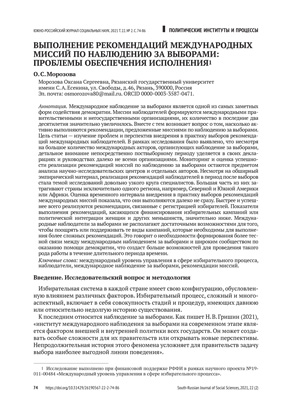Аннотация
Международное наблюдение за выборами является одной из самых заметных форм содействия демократии. Миссии наблюдателей формируются международными правительственными и негосударственными организациями, их количество в последние два десятилетия значительно увеличилось. Вместе с тем возникает вопрос о том, насколько активно выполняются рекомендации, предложенные миссиями по наблюдению за выборами. Цель статьи — изучение проблем и перспектив внедрения в практику выборов рекомендаций международных наблюдателей. В рамках исследования было выявлено, что несмотря на большое количество международных акторов, организующих наблюдение за выборами, детальное внимание непосредственно поствыборному периоду уделяется в своих декларациях и руководствах далеко не всеми организациями. Мониторинг и оценка успешности реализации рекомендаций миссий по наблюдению за выборами остаются предметом анализа научно-исследовательских центров и отдельных авторов. Несмотря на обширный эмпирический материал, реализация рекомендаций наблюдателей в период после выборов стала темой исследований довольно узкого круга специалистов. Большая часть из них затрагивают страны исключительно одного региона, например, Северной и Южной Америки или Африки. Оценка временного интервала внедрения в практику выборов рекомендаций международных миссий показала, что они выполняются далеко не сразу. Быстрее и успешнее всего реализуются рекомендации, связанные с регистрацией избирателей. Показатели выполнения рекомендаций, касающихся финансирования избирательных кампаний или политической интеграции женщин и других меньшинств, значительно ниже. Международные наблюдатели за выборами не располагают достаточными возможностями для того, чтобы поощрять или поддерживать те виды кампаний, которые необходимы для выполнения более сложных рекомендаций. Это говорит о необходимости формирования более тесной связи между международным наблюдением за выборами и широким сообществом по оказанию помощи демократии, что создаст больше возможностей для проведения такого рода работы в течение длительного периода времени.
Ключевые слова
Информация о финансировании
Исследование выполнено при финансовой поддержке РФФИ в рамках научного проекта №19-011-00484 «Международный уровень управления в сфере избирательного процесса».
Библиографические ссылки
Acemoglu, D., Robinson, J. A. (2012). Why Nations Fail: The Origins of Power, Prosperity and Poverty. New York: Crown Business.
Arceneaux, C. and Leithner, A. (2017). International monitors. In Norris, P. and Nai, A. (Eds) Election Watchdogs: Transparency, Accountability and Integrity (pp. 31–53). Oxford: Oxford University Press.
Atwood, R. (2012). How the EU Can Support Peaceful Post-Election Transitions of Power: Lessons from Africa. Retrieved from https://www.europarl.europa.eu/Reg Data/etudes/note/join/2012/457110/EXPO-AFET_NT (2012) 457110_EN.pdf
Benstead, L., Kao, K., and Lust, E. (2020). Does it Matter What Observers Say? The Impact of International Election Monitoring on legitimacy. Mediterranean Politics. DOI:10.1080/13629395.2020.1730601
Bjorklund, E. (2004). Beyond Free and Fair: Monitoring Elections and Building Democracy. Washington, D.C.: Woodrow Wilson Center Press.
Bush, S. S. and Prather, L. (2017). The Promise and Limits of Election Observers in Building Election Credibility. The Journal of Politics, 79(3), 921–935.
Carothers, T. (1997). The Rise of Election Monitoring: The Observers Observed. Journal of Democracy, 8(3), 17–31.
Decker, U. E. (2012). The Cost of Exposing Cheating: International Election Monitoring, Fraud, And Post-Election Violence In Africa. Journal of Peace Research, 49(4), 503–516.
Dodsworth, S., Bertrand, E., Hitchen, J. (2020). Learning from Success: The Implementation of Election Observation Recommendations in Sub–Saharan Africa. London. Retrieved from https://www.wfd.org/wp-content/uploads/2021/03/Fleering-from-Success-The-Implementation-of-Electoral-Observation-Recommendations-in-Sub-Saharan-Africa.pdf
Grishin, N. V. (2021). Politika gosudarstv v otnoshenii mezhdunarodnogo nablyudeniya za vyborami. [Policies of States Towards International Election Observation]. Politicheskaya ekspertiza: POLITEKS [Political Expertise: POLITEX], 17(2), 150–162. DOI: 10.21638/spbu23.2021.203
Grishin, N. V., Linders, A. M. R. (2020). Decentralizaciya sistemy upravleniya vyborami [Decentralization of Electoral Governance]. Politiya [Politiya] 3, 99–115. DOI: 10.30570/2078-5089-2020-98-3-99-115
Grishin, N. V. (2019) Razvitie mezhdunarodnyh izbiratel’nyh standartov: chto dal’she? [Development of International Electoral Standards: What’s Next?]. Politicheskaya nauka [Political Science] 1, 33–47. DOI: 10.31249/poln/2019.01.02
Hyde, S. D. (2008). How International Election Observers Detect and Deter Fraud. In Alvarez, R. M., Hall, T. E., and Hyde, S. D. (Eds) Election Feud: Detecting and Deterring Electoral Manipulation (pp. 201–215). Washington, D.C.: Brookings Institution Press.
Hyde, S. D., Marinov, N. (2019). Codebook for the National Elections Across Democracy and Autocracy (NELDA) Dataset. Retrieved from https://nelda.co/#codebook
Kelley, J. (2011). Do International Election Monitors Increase or Decrease Opposition Boycotts? Comparative Political Studies, 44(11), 1527–1556.
Kelley, J. (2012). Monitoring Democracy: When International Election Observation Works, and Why It Often Fails. Princeton: Princeton University Press.
Laakso, L. (2002). The Politics of International Election Observation: The case of Zimbabwe in 2000. Journal of Modern African Studies, 40(3), 437–464.
Marquardt, K. L. et al. (2018). What Makes Experts Reliable? V-Dem Working Paper 68. Retrieved from https://www.v-dem.net/media/filer_public/d0/b2/d0b 2160c-07f8-4f80-9e04-8fe2ec67b5ba/v-dem_working_paper_2018_68.pdf
Martinez, C. F., Nai, A., Norris, P. (2015). Democratic Diffusion: How Regional Organizations Strengthen Electoral Integrity. Executive Report. Washington D. C.: Organization of American States. Retrieved from https://www.electoralintegrityproject.com/democratic-diffusion
Morozova, O.S. (2019). Rol’ Afrikanskogo Soyuza v regulirovanii izbiratel’nogo processa na kontinente [The Role of The African Union in The Regulating the Election Process]. Kaspiyskiy region: politika, ekonomika, kul’tura [The Caspian Region: Politics, Economy, Culture], 3, 122–128.
Norris, P. (2004). Electoral Engineering: Voting Rules and Political Behavior. Cambridge: Cambridge University Press.
Nwokeke, P., Osinakachukwu, J. (2011). The Electoral Process and Democratic Consolidation in Nigeria. Journal of Politics and Law Archives, 4(2), 128–138
Roberts, H. et al. (2017). Evaluation of EU Election Observation Activities: July 2016–January 2017. Retrieved from https://eeas.europa.eu/ sites/default/files/evaluation EU_electionobservationactivities-fr.pdf
Smidt, H. (2016). From a Perpetrator’s Perspective: International Election Observers and Post-electoral Violence. Journal of Peace Research, 53(2), 226–241.
Van der Meer, T. W. G. (2017). Political trust and the crisis of democracy. In: Oxford Research Encyclopedia of Politics. Available at: https://doi.org/10.1093/acrefore/9780190228637.013.77
Wojtasik, W. (2013). Functions of Elections in Democratic Systems. Political Preferences, 1(4), 25–38.


